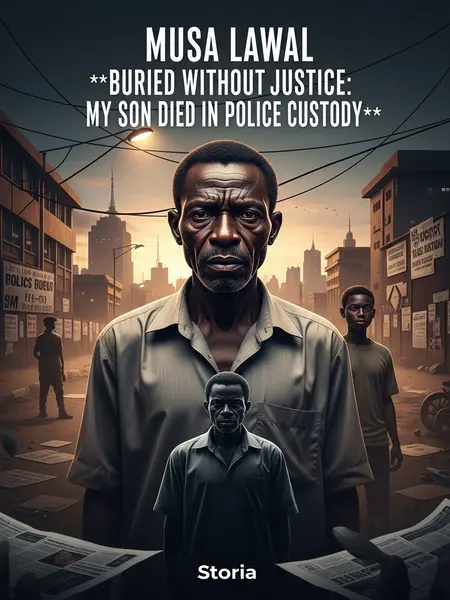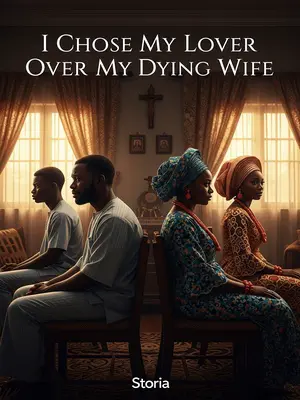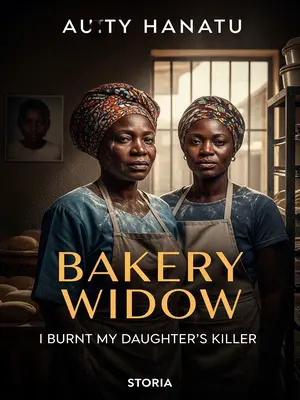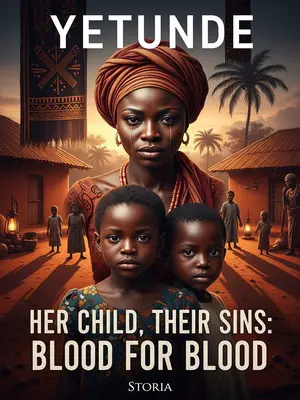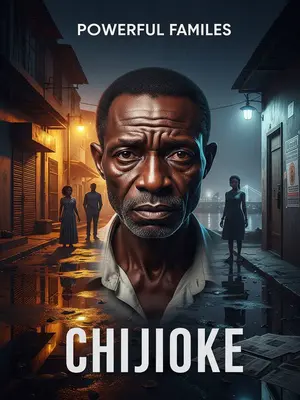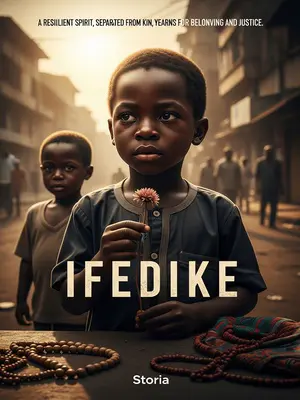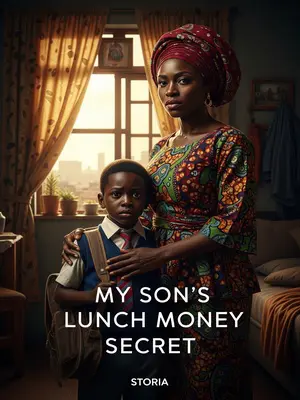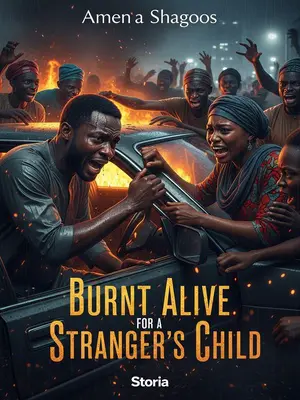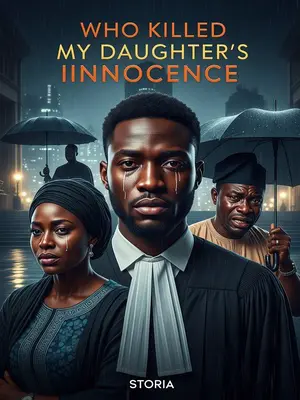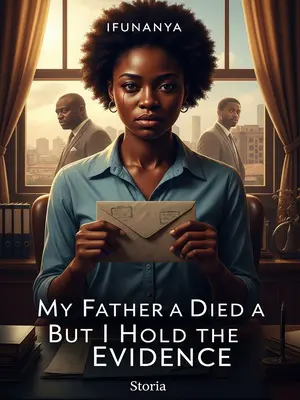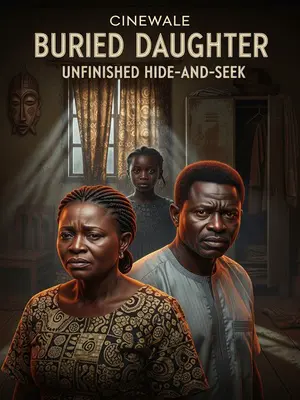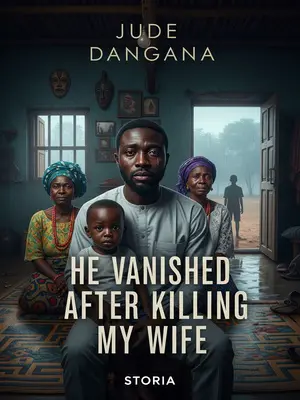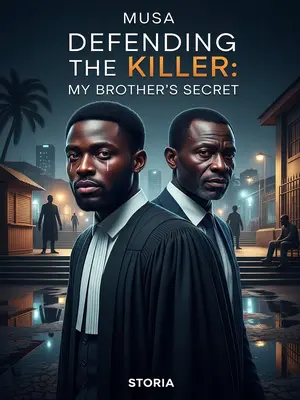Chapter 1: The Knock Before Dawn
It started with a knock at the door, before sunrise. By nightfall, Musa Lawal’s world would never be the same.
A person fit get job, small flat for GRA side, and even national ID card, but just because dem no get that temporary residence paper—wetin police dey call 'indigene certificate'—na so police go carry am go post. That certificate be like ticket for city people wey no get local government registration; without am, wahala dey wait.
Sometimes, the struggle just dey tire person. For cities like Lagos, Port Harcourt, and Abuja, the real wahala no be crime. Na paper. Just one signature wey miss, your life fit scatter like groundnut for market. That indigene certificate alone dey put fear for person chest. Even if you dey hustle, hold your ID, dey mind your business, you fit still jam police palava. Na so Naija be. Sometimes, the only difference between freedom and cell na just one local government stamp.
Back then, these kinds of things happen steady. Dem call am 'detention and repatriation.'
People just dey vex for the system, but who you go complain to? Everybody sabi one person—cousin, friend, or neighbour—wey don suffer that kind wahala. The words 'detention and repatriation' dey carry real pain, especially for people wey leave village to city come find better life. Na ugly reality wey people try forget, until e touch your own.
But this time, na university student die for hospital three days after police carry am. The detention center just write 'sudden death.'
This one no be ordinary matter. How student wey get hope for tomorrow go just waka like that? People begin ask serious question. "How student go die inside police hand, and na sudden death dem go write?" Even old men for street begin talk, "No be our pikin dem dey kill so?" Ewo!
His death shook the whole country.
Radio and newspapers carry am everywhere. For campus, students—Christian and Muslim—gather shout for justice. Even lecturers join. Mothers feel am pass; who no go fear for their own child? Anger spread reach market and church; pastors dey pray, imams dey shout for Friday mosque. For once, e be like everybody agree say enough is enough.
1
On March 20, 2003, Musa Lawal got a phone call at his house in Makurdi, Benue State. The caller was a female classmate of his first son, Lawal Ibrahim.
That morning, sun never even show finish when phone begin ring. Musa, still dey rub sleep comot for eye, answer am. The girl voice, soft but trembling, carry heavy wahala. You fit hear say she don cry tire. Musa heart jump one kind. For Naija, early morning call dey mean wahala. He grip the phone tight, bracing for bad news.
She said, “Uncle, something has happened to Ibrahim in Port Harcourt. Police pick am up, carry am go detention center. Now he dey hospital. You need come quick.”
Musa just dey shake head, confusion and worry mixing for body. "How my pikin go dey hospital because of police?" The girl’s words come out like stone for mouth. She dey call am 'Uncle'—as custom demand—but fear dey hide under her respect. Musa wan ask many questions, but tongue heavy. Mind dey race, he dey pray inside, "God, abeg, make e no be wetin I dey think."
She quiet for long, then finally say, “Uncle, Ibrahim is dead.”
The silence loud pass generator. Musa feel as if dem pour cold water for body. He hold phone like statue. Even wall clock for parlour stop to tick. When the news finally sink, he let out low, pained sound—deep from chest—the kind only father fit make when life don break. Grief wey no get name. Neighbours hear am, later say dem never hear grown man cry like that before.
Musa Lawal no fit believe am, but he no fit ignore am either. He hide the news from his wife, rush go find taxi reach Abuja, link up with younger son, Lawal Yusuf, wey dey work there. Together with Ibrahim’s uncles—like five or six of them—dem enter night bus to Port Harcourt.
The journey to Abuja na blur. Musa just dey hold prayer beads, mouth dey move small. When he see Yusuf, na only look dem exchange—no need talk. As uncles reach, compound full of murmurs. For Naija, if bad thing happen, extended family dey move as one. The men gather, agree sharp sharp, arrange first night bus. That bus station dey choke with people—hawkers dey sell gala and pure water, conductors dey shout destination. But for Musa and family, everywhere just be like film. Their world pause.
Inside the bus, Musa Lawal just dey cry, tears no gree stop. At checkpoint, police ask am, “Oga, wetin happen?” Musa try talk but voice dey shake. One officer say, "Oga, abeg, that one no fit happen. If na true, police go show for your house sharp sharp. No be small girl go call you." Musa just nod, no strength to argue. Some old women for bus dey pray, "God, let this not be our portion."
Somebody come offer Musa gala and suya from window as hawker pass. He just wave hand, face window, no appetite. Even hunger run from him body, grief swallow everything.
By daybreak, dem reach Port Harcourt. Ibrahim’s classmates meet them for motor park, carry them go mortuary. On the way, tears just dey flow, the bad news finally sink deep.
As city dey wake up, Musa no see traffic or roadside sellers. The classmates—two guys and one girl—eyes red from cry. "Uncle, try hold yourself," one whisper, but tears no gree stop. Port Harcourt, usually noisy, feel quiet for Musa. E be like the city dey mourn with them. From motor park to mortuary, every turn heavy. Nobody talk much; silence full of sniffles.
At the mortuary, Musa Lawal see Ibrahim’s body, covered with white cloth.
The attendant, tired and sweat-soaked inside stained lab coat, lead them in. The air hot, flies buzz around, and faint Yoruba gospel music dey play from radio for one corner. Smell of disinfectant mix with something worse. Musa leg dey shake as he approach the slab. When dem lift the cloth, he see him son—still, peaceful, but gone. Musa wish say na mistake, that Ibrahim go stand up shout, "Daddy, na joke." But reality hit am like trailer. The wailing start again. One uncle slump for bench, clutch head. "Ya Allah, ka karbi ran wannan yaro," he pray, voice broken. Even mortuary worker look away, embarrassed by family pain.
Ibrahim really don go.
Hope die that moment. Grief fill the room like harmattan dust—no escape. People hold Musa as knee buckle. For Naija, seeing the body dey finally break hope. Loss don complete. Family stand around, head bowed. Some pray quietly, others curse system under breath. "See wetin our country don turn to," one uncle mutter. Musa just whisper, "God, why?"
Big thing happen—person pikin die—yet no single official come tell family wetin happen. Mortuary people dey rush dem to bury, say dem no fit keep body longer.
"Oga, abeg, we no fit keep corpse again. Na so government talk," mortuary man insist, shuffling papers. Grief process dey rush like person dey block road. No police, no local government, nobody explain anything. For Naija, bureaucracy dey quick only when dem wan dodge blame. Family suppose just swallow pain and move on. Uncle voice rise, "Na so dem dey treat us? Somebody son die, na rush-rush burial? No dignity, nothing?"
All dem get na one small paper: just one line—sudden death, cerebrovascular accident, sudden heart disease.
Musa stare at the paper, hand dey shake. E feel like insult on top injury. Just one lazy line—no detail. That paper suppose carry truth, but only confusion dey there. One younger cousin, nursing student, hiss. "Cerebrovascular accident? Which kind grammar be that? Dem think say we no sabi?" The certificate words empty—like dem wan bury truth join Ibrahim.
But family know say na lie. Ibrahim strong, never get heart wahala before.
Musa remember as Ibrahim dey play ball for university team—never faint, never complain sickness. Even during fasting, he go trek go mosque, still help mama for kitchen. No heart disease for family. This official cause of death no gel. Elders exchange look—everybody sabi when government dey hide something. Suspicion thick for air.
Worse, Musa Lawal see plenty bruises for Ibrahim body at mortuary. He sure say dem dey hide something about his son death.
As Musa bend over son body, he notice dark marks for arms, back, neck. Some fresh, some old. "See wetin dem do am," Musa mutter. Mortuary attendant avoid eye. Bruises dey tell story of struggle—of pain, not sickness. Musa anger mix with grief, burn hot. "Who beat my pikin? Wetin una do to am?" Nobody answer. Family dey whisper, "This death get K-leg o."
With no answer, Musa Lawal refuse to bury body. Later, he go thank God—this na best decision he make.
For Naija, if you bury body sharp sharp, case fit die sharp sharp. Musa insist, "I no go bury am until I know wetin really happen." Elders support am: "We must get justice for Ibrahim." That stubbornness—faith and papa love—go later prove wise. This one act of defiance go give family small leverage against system. "If no be God and elders, dem for silence this matter," Musa go talk later, voice proud and sad.
But Musa’s stubbornness would soon drag the whole family into a fight they never imagined.
